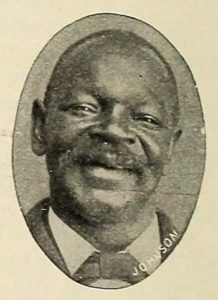
George W. Johnson, 1898
The birth of George Washington Johnson in 1846 is celebrated on this date. He was a Black singer, musician, and pioneer in American recorded music.
He was born into slavery, and his birthplace is unknown, but Johnson moved to Harlem, New York, in the 1870s and became a street performer. His songs "The Whistling Coon" and "The Laughing Song,"' both essential minstrel pieces, were the most famous American songs in the 1890s record industry. Technology didn't allow for duplicating Edison cylinders at that point, so Johnson, with a pianist backing him, sang his songs thousands and thousands of times at about .20 cents each. An estimated 25,000 copies were in print by 1894 alone.
"I heard some people say here comes the dandy darkey, here he comes this way," are Johnson's lyrics in "The Laughing Song." "And when I heard them say it, why I'd laugh until I'd cry," are others, and laugh he did. It has been noted that listening to Johnson laugh was scary, considering his plight as a black man in early America.
By 1905, Johnson's popularity had declined. New recording technology enabled the pressing of thousands of duplicate records from a single master, and Johnson no longer needed to record each copy individually. His friend Len Spencer, now a successful artist and booking agent, hired Johnson as an office doorman. Johnson worked for Spencer, lived in his office building for several years, and then moved back to Harlem. In 1914, at age 67, George W. Johnson died from pneumonia. He was buried in an unmarked grave in Maple Grove Cemetery in Kew Gardens, Queens, New York.
LOST SOUNDS:
Blacks and the Birth of the Recording Industry, 1890-1919 by Tim Brooks
University of Illinois Press